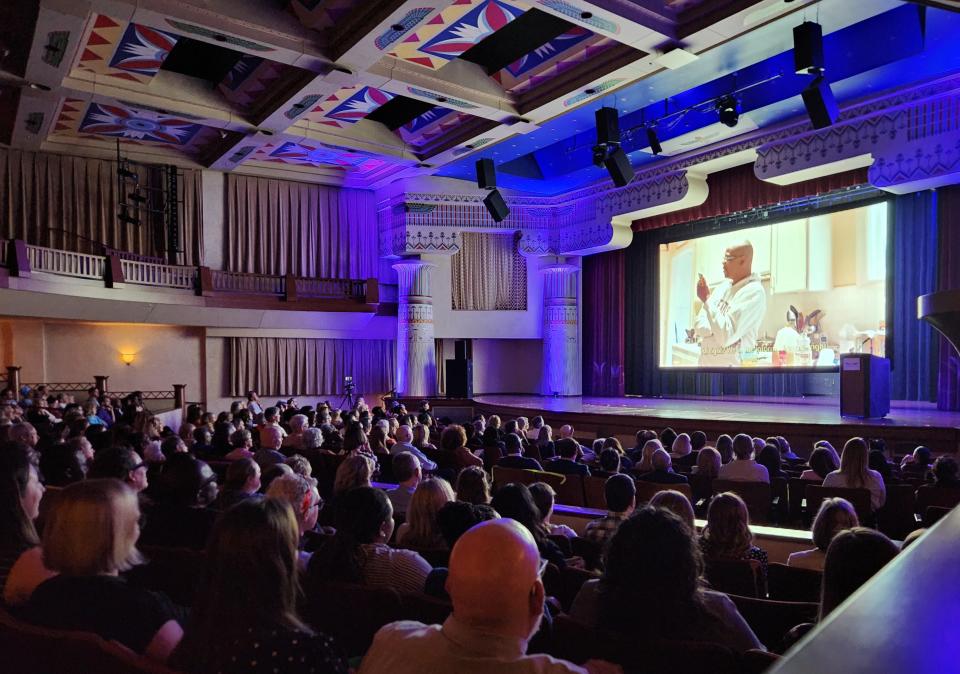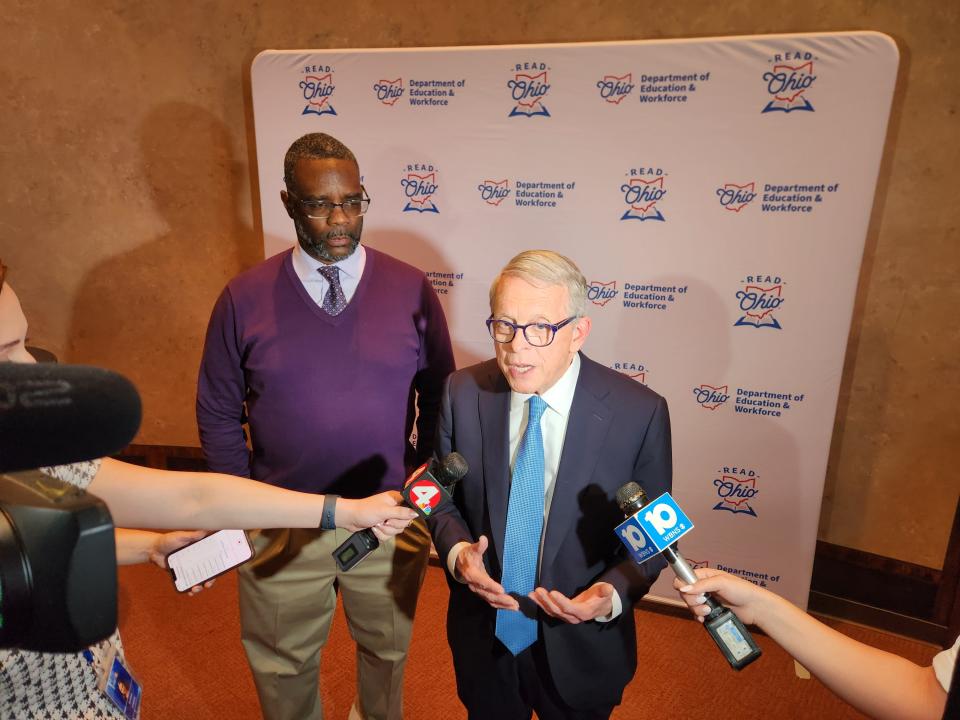'We know what works' DeWine pushes Ohio schools to adopt science-based literacy education
- Oops!Something went wrong.Please try again later.
Ohio Gov. Mike DeWine is once again making the push for phonics-based literacy education for Ohio students after last week's State of the State address.
In Columbus, guests packed the Lincoln Theatre in King-Lincoln Bronzeville on Tuesday to join DeWine in viewing a documentary that champions an emerging science of how kids learn to read. DeWine, along with education leaders, parents and community members viewed a screening of the “The Right to Read,” a 2023 documentary that follows an NAACP activist, a teacher, and two families who champion the importance of literacy.
In addition to highlighting the importance of literacy, the documentary also addresses an increasingly controversial topic of how children learn to read. For several years, DeWine has spoken about what he said is the best method, a method addressed in the documentary called the "science of reading."
DeWine said Tuesday the science of reading method, which is in essence, reading programs that teach students to break down words and sounds by learning the rules of the language, is needed to keep Ohioans educated and the workforce competitive.

"The good news is we know what works," DeWine said Tuesday. "We have to have people who are well-educated, we certainly have to have people who can read."
Kareem Weaver, an NAACP activist, teacher and the film's producer, said literacy is a fundamental right in society, and implementing science-based phonics education
"This is a civil rights issue," Weaver said. "This is not something that's just a bureaucratic thing — this is a civil rights issue. Kids deserve the right to read, and it's our responsibility as the adults wherever we stand … that we're all along."
DeWine was also joined by Columbus City Schools Superintendent Angela Chapman, who delivered opening remarks. Columbus City Schools began using the science of reading method in 2020 and has seen some improvements in early literacy skills, The Dispatch previously reported.

"We're committed to ensuring our approach is inclusive, reaching students of all backgrounds and abilities because we understand that literacy opens doors to opportunities and is a right, not a privilege," Chapman said Tuesday.
What is the 'science of reading'?
The debate over how kids learn to read has been quietly raging for decades, as outlined in the Right to Read documentary.
One method, structured literacy (or the "science of reading") teaches students to break words down into their phonemes or sounds.
The other method widely used in schools is called balanced literacy or whole language, and gives children strategies to decipher unfamiliar words by looking at a picture or context of the known words in a sentence. These are called cues, and while sounding the word out can be one, it's only supposed to be used as a measure of last resort.
Both sides of the debate have followers, but science and educational professionals are beginning to favor structured literacy.
In April 2022, a federally funded study from the University of Delaware showed that Reading Recovery, one of the most widely used cueing programs, lowered student performance in the long run, The Dispatch previously reported. Children who used the program did well in first grade, but then they scored lower on state reading tests in grades three and four compared to students who didn't participate.
Late last year, Worthington-based Reading Recovery Council of North America filed a lawsuit in Franklin County Common Pleas Court seeking to block changes in last year's biennial budget which makes structured literacy programs prohibited under the new law, The Dispatch previously reported.
DeWine tours state after urging expansions of science of reading
At his state-of-the-state address last week, DeWine urged universities to teach educators about structured literacy and also to said that pre-school should be aligned for preparing children for the science of reading. This week, he had several stops in Cleveland and Columbus this week where he viewed the documentary and held roundtable discussions.
"We're now following the science of reading, but we still have too many classrooms in the state of Ohio where that's not occurring," DeWine said. "We have to get every classroom, every child — every child deserves that."
@Colebehr_report
Cbhehrens@dispatch.com
This article originally appeared on The Columbus Dispatch: DeWine pushes 'science of reading' literacy education at documentary

